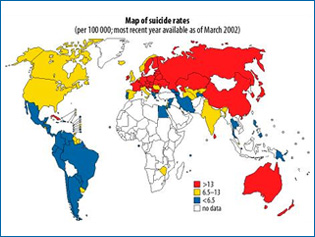
The alarming rise in the rate of suicide worldwide has led researchers to intensify their search for risk factors susceptible to suicide prevention strategies.
In an article published in Psychiatry Research Roman Kotov, PhD and colleagues Daniel Capron, MS and Norman Schmidt, PhD confirmed that anxiety sensitivity — a fear of the sensations associated with anxiety —plays a role in increased risk of suicide. The researchers asked 390 Russian adults to complete a measure of anxiety sensitivity which included three lower-order factors representing cognitive, physical and social concerns, as well as questionnaires that measured suicidal ideation, previous attempts and hazardous alcohol consumption.
The researchers found, as expected, that heavy alcohol use was a leading risk factor for suicide, but since patterns of alcohol use are not easily changed, their investigation of the role of anxiety sensitivity is more relevant to suicide prevention, since anxiety sensitivity has been shown to be amenable to rapid improvement. Their studies confirmed that higher scores on the anxiety sensitivity index were associated with increased risk of suicide. More significantly, they discovered that the combination of higher scores on the cognitive concerns subscale and lower scores on the physical concerns subscale was a significant indicator of elevated risk for suicide. This finding provides support for the “interpersonal-psychological” theory of suicide — the theory that the ability for lethal self-injury is acquired through repeated experiences of pain. It also suggests that proven techniques for reducing anxiety sensitivity may play a role in clinical and educational strategies for reducing the rate of suicide.
The article is titled “A cross-cultural replication of an interactive model of anxiety sensitivity relevant to suicide.” Daniel Capron, a doctoral student in clinical psychology at Florida State University was the lead author. Norman (Brad) Schmidt is director of the Anxiety and Behavioral Health Clinic at Florida State University. Roman Kotov is Assistant Professor of Psychiatry at Stony Brook University.